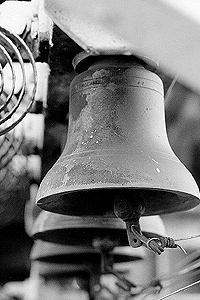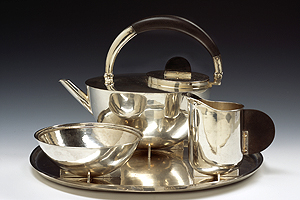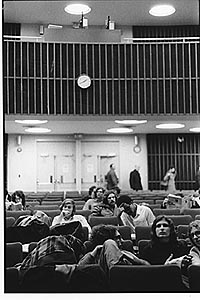July-Aug. Highlights
 | |
Rockefeller Memorial Chapel
Carillonathon!
6 p.m. Sundays, through July 29
5850 S. Woodlawn Ave..
http://rockefeller.uchicago.edu/
Catch the bells before they fall silent during restoration! Bring a picnic and enjoy this free series of carillon concerts from the Chapel’s east lawn. All are welcome to climb the tower at 5:30 p.m. with the carillonneur for a guided tour and spectacular bird’s eye view of the South Side. Carillon bells are designed to last for centuries, and many European carillons date back 400 years or more. However, the playing mechanism in the University’s carillon that allows the performer to control the sound of the bells, which is entirely mechanical, has deteriorated over the years. In addition to many other renovations, the iron clappers, which are softer than bell bronze, have become flattened with use and will be replaced. The result after restoration will be a significantly improved listening and viewing experience for the thousands of people who hear this instrument at special events throughout the year. The Laura Spelman Rockefeller Memorial Carillon, given to the University of Chicago by John D. Rockefeller Jr., in memory of his mother, was dedicated on Thanksgiving Day, 1932. Free.
 Marianne Brandt, Tea Service: Tea Infuser (Pot), Creamer, Sugar Bowl, and Tray, 1924, | |
Smart Museum of Art
Lunch-Hour Talks
Noon Friday, July 20 and Friday, Aug. 3
5550 S. Greenwood Ave.
http://smartmuseum.uchicago.edu
The Smart Museum of Art is holding two lunch-hour talks. The first, “From Hand to Machine: German and Austrian Design, 1890-1933,” will take place at noon, Friday, July 20. Victor Margolin, professor in art and design history at the University of Illinois at Chicago, will give the illustrated lunch-hour talk. The discussion will investigate the changes in 20th-century German and Austrian design. The second, “A Pattern a Day Gave Form Function: Mass Production of Decorative Ceramic Design,” will take place noon Friday, Aug. 3. This talk will discuss changing decorative designs in mass-produced German ceramics from the late 1920s and early 1930s. Rolf Achilles, adjunct associate professor in art history, theory and criticism at the School of the Art Institute, will lead the discussion. The talks are free, but advanced registration is required. Box lunches may be ordered. To register, call (773) 702-2351 or e-mail smart-education@uchicago.edu.
 Ivory game board, Megiddo, Israel, 13th century BC. | |
Oriental Institute Museum
Family Event: Games Pharaoh Played
1-4 p.m. Sunday, July 22
1155 E. 58th St.
http://oi.uchicago.edu/
Join the Oriental Institute for a free festival of games that ancient Egyptian pharaohs and their children played more than 3,000 years ago. Participants will visit museum galleries to see ancient game boards made of precious woods, ivory and gold and learn how to play board games the ancient Egyptians enjoyed. “King Tut” may even appear to challenge participants skills and also introduce board games played by his neighbors in ancient Nubia and Israel. There will also be a showing of Mummies Made in Egypt, an animated and live-action film. The afternoon will conclude with the creation of an ancient-style board game to take home. This event is presented in conjunction with The Art of Play, the city-wide summer celebration sponsored by the Department of Cultural Affairs.
 Doc Films 40th Anniversary Birthday Party, 1972 (Photo by Frank Gruber ) | |
Special Collections Research Center
“Doc Films 75th Anniversary”
Monday, July 16 through Friday, Aug. 31
1100 E. 57th St.
http://www.lib.uchicago.edu/e/spcl/
![[Chronicle]](/images/sidebar_header_oct06.gif)